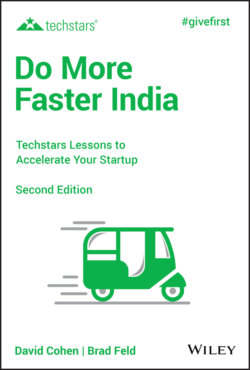Читать книгу Do More Faster India - Sacca Chris, Chris Sacca, Brad Feld - Страница 24
ОглавлениеChapter 8 Forget the Kitchen Sink
David Cohen
David is the cofounder and Managing Partner of Techstars.
I’ve seen “everythingitis” kill many a startup. This is the disease a startup gets when it sets out to add more features than the competition does. It is a fundamentally flawed strategy that presumes that users will adopt a new service or product just because it has more features. Most people use a particular service, product, or technology because it does one thing really, really well. For example, a lot of people use their computer just to access the Internet and browse, although the computer itself has far more power than most people will ever use. Think about your own experiences and you’ll understand that this is true.
I’ve been guilty of trying to solve problems by throwing in more and more features, including the kitchen sink. iContact1 was the second startup that I founded, and it had a serious case of everythingitis. I proudly told everyone that iContact did more than any other mobile social networking product that existed at the time. Basically, iContact was a mobile social network that solved the problem of knowing what your friends were up to—Foursquare before it existed. But the market said: “So what?” No one, including us, understood the one thing iContact did better than anybody else in the world. When it didn’t take off, we made the fatal mistake of responding by adding more features (including several shiny new kitchen sinks). In retrospect, we probably should have been removing features and focusing more on the few things that our users did like. iContact eventually died, and that’s how I learned this lesson firsthand.
Several Techstars companies came in with a plan like “Yelp + Facebook + YouTube + kitchen sink.” We coached them early on that they have to be the best in the world at one thing and then build from there. We ask them to focus on their passion and to pick the smallest meaningful problem that they can solve better than anyone in the world.
I love what Ev Williams (founder of Blogger and Medium and cofounder of Odeo and Twitter) says about this:
Focus on the smallest possible problem you could solve that would potentially be useful. Most companies start out trying to do too many things, which makes life difficult and turns you into a me-too. Focusing on a small niche has so many advantages: With much less work, you can be the best at what you do. Small things, like a microscopic world, almost always turn out to be bigger than you think when you zoom in. You can much more easily position and market yourself when more focused. And when it comes to partnering, or being acquired, there’s less chance for conflict. This is all so logical and, yet, there’s a resistance to focusing. I think it comes from a fear of being trivial. Just remember: If you get to be #1 in your category, but your category is too small, then you can broaden your scope and you can do so with leverage.
Ev’s last point is key. If you’re the best in the world at thing X, it’s much easier to get to X + Y. You’ll have credibility from your customers who already love you for what you do so well. They’ll be patient and willing to help you build Y. It’s a place of strength, and it can be so much easier to do more from there.
I learned from my iContact experience to not repeat the same mistake with Techstars, and we didn’t grow the company before our business model had been validated. We started with one accelerator in Boulder in year 1 and 2, expanded to Boston in year 3, then to Seattle and New York in year 4 and eventually internationally, in London. We now have over 45 accelerators in 13 countries and we work with Fortune 500 companies, communities, and business schools. We had the vision to expand internationally and develop partnerships, but if we had tried to carry that out in our founding years we probably would have lost the whole company.
If you’re early in the life of your startup, do yourself a favor and figure out what one thing you’re going to be the best in the world at doing. By all means, don’t stop there, just as we didn’t with Techstars. But spend some time to think about how you can cross the finish line and avoid throwing in the kitchen sink. The market will love you for it.
Note
1 1You might have heard of iContact, but it’s not the one that I worked on. The domain name was recycled, and today iContact is a very successful email marketing company. My friend Ryan Allis ran it until 2012, when it was acquired by Vocus for $169 million. Yes, I sold him the domain name after my iContact failed. It was the most revenue my failed company ever had!
